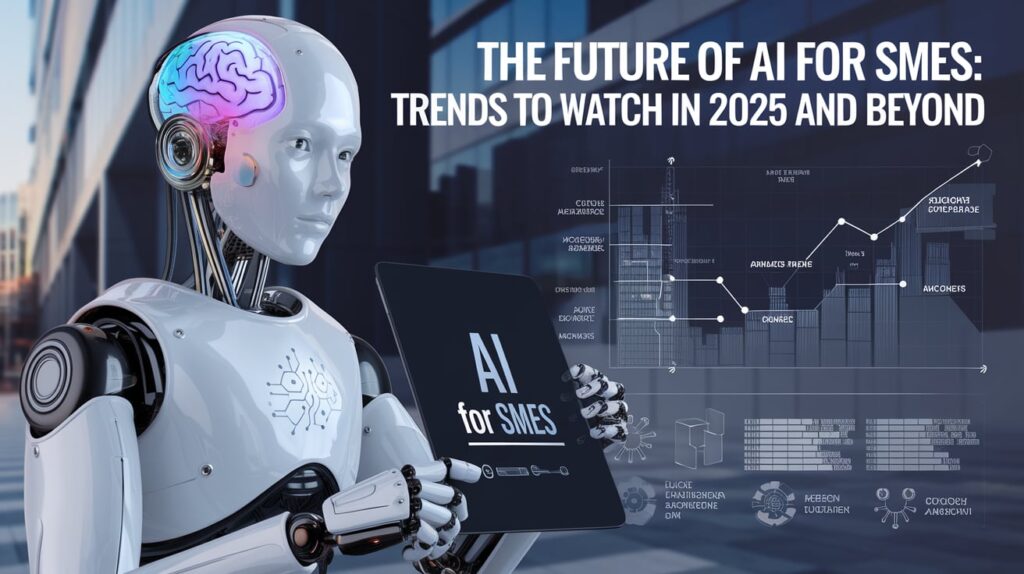Artificial Intelligence (AI) is becoming increasingly vital for small and medium-sized enterprises (SMEs), enabling them to compete effectively against larger corporations. As AI technology evolves, it levels the playing field, providing SMEs with tools that were once exclusive to well-funded companies. This blog will explore key trends that will shape AI adoption for SMEs in 2025 and beyond.
1. Democratization of AI Tools
- Overview of Accessible AI Platforms: The rise of user-friendly platforms like ChatGPT and Shopify’s AI tools has made AI accessible to SMEs without requiring extensive technical expertise.
- Low-Code and No-Code Solutions: These solutions empower non-technical users to implement AI, facilitating quicker adoption and integration into business processes12.
2. Hyper-Personalized Marketing
- Understanding Customer Behavior: AI’s ability to analyze consumer data allows SMEs to tailor marketing strategies effectively.
- Machine Learning for Targeted Campaigns: Utilizing machine learning algorithms, businesses can deliver personalized marketing efforts that resonate with individual customer preferences25.
3. AI for Enhanced Cybersecurity
- Vulnerability of SMEs: Many small businesses face significant cybersecurity threats due to limited resources.
- AI-Driven Threat Detection: Implementing AI systems for real-time monitoring and threat response can help protect sensitive data and maintain business integrity14.
4. Automation of Routine Tasks
- Streamlining Administrative Processes: AI can automate repetitive tasks such as data entry, scheduling, and invoicing, freeing up time for strategic initiatives.
- Popular Automation Tools: Tools like Fireflies for meeting transcription and Mailchimp for email marketing are essential for enhancing productivity in small businesses35.
5. AI-Powered Financial Management
- Automating Financial Operations: AI tools can streamline expense tracking and forecasting, making financial management more efficient.
- Benefits of Fintech Platforms: Emerging fintech solutions provide SMEs with advanced capabilities that were previously unattainable due to cost barriers24.
6. Integration with IoT (Internet of Things)
- Synergy Between AI and IoT: Combining AI with IoT devices allows SMEs to leverage real-time analytics for better inventory and supply chain management.
- Cost-Saving Benefits: This integration can lead to significant operational efficiencies and cost reductions5.
7. Focus on Ethical AI and Transparency
- Emphasis on Ethical Practices: As AI adoption grows, so does the need for ethical considerations regarding data use and privacy.
- Tools for Transparency: Implementing frameworks that ensure compliance with regulations is crucial for building trust with customers23.
8. Voice and Visual Search Optimization
- Impact on E-commerce: The rise of voice assistants and image recognition technology is changing how consumers search for products online.
- Optimizing Search Platforms: SMEs must adapt their digital presence to enhance visibility through voice and visual search capabilities14.
9. AI-Driven Talent Management
- Simplifying Recruitment Processes: AI tools can streamline hiring by analyzing candidate data to predict performance and fit.
- HR Management Solutions: Platforms that utilize AI for talent management can significantly improve employee retention strategies35.
10. AI in Sustainability Practices
- Supporting Eco-Friendly Operations: AI can help SMEs track their carbon footprints and optimize energy usage, contributing to sustainability goals.
- Competitive Advantage in Sustainability: Businesses focusing on eco-friendly practices are likely to attract more customers in an increasingly environmentally conscious market24.
How SMEs Can Prepare for the AI Revolution
- Start Small with Affordable Tools: Begin by implementing cost-effective AI solutions tailored to specific business needs.
- Employee Training: Upskilling staff is essential for maximizing the benefits of new technologies.
- Strategic Partnerships: Collaborating with experienced AI consultants can facilitate smoother transitions into using advanced technologies13.
Conclusion
The trends shaping AI adoption in 2025 highlight its potential as a transformative force for SMEs. By embracing these technologies, small businesses can enhance efficiency, improve customer experiences, and drive growth. It is crucial for SMEs to adopt a proactive approach towards integrating AI into their operations, ensuring they remain competitive in an evolving landscape. Encouraging SMEs to embrace these advancements will not only foster innovation but also pave the way for sustainable success in the future.
